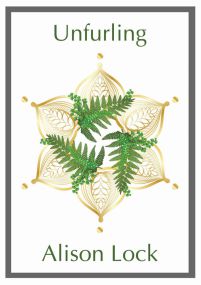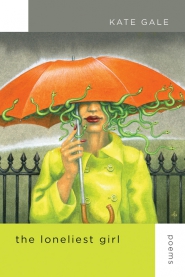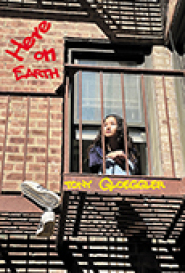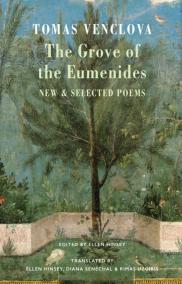
Alison Lock, Unfurling, Palewell Press, 2022. ISBN: 978-1-911587-59-0. 41pp. £6.90.
I received my copy of Unfurling on the same morning as the threatened Russian invasion of Ukraine became a reality. Compared to the horror of war on a scale not seen in Europe for 70 years and the threat it brings, Alison Lock’s sequence of 33 poems might be dismissed as of no consequence when compared to such violence. Certainly, the pleasure to be derived from Unfurling is very fragile indeed, akin to finding joy in the first snowdrops of the year, which features as a potent symbol in the collection:
Snowdrops bow
below green hoods,
their white petals
a hope for peace.
Does such a sentiment offer solace to those caught up in the sort of brutality currently being inflicted on the people of Ukraine? That a case has to be made for poetry, especially “snowdrop” poetry, is not a new debate, of course. We only have to look back to the horrors of the last century, namely the Second World War, the Holocaust and the bombing of Hiroshima and Nagasaki. Theodor Adorno, the German philosopher, famously posited the question: can there be poetry after Auschwitz? His conclusion was not that there couldn’t be poetry (as he is often misquoted as saying) but that it would be “barbaric” to write it. It is not entirely clear what he meant by this. Did he mean that writing poetry is somehow to immure oneself in an ivory castle, ignoring the grim reality of humanity’s worst actions, and therefore to be complicit in the barbarism? Whatever the interpretation, Adorno did retract his position on this issue and poetry, of course, continues to be written in vast quantities. Indeed, some poetry has an explicit agenda which is far from being unengaged with critical issues affecting us all. Nature poetry, which Unfurling represents, is more likely these days to be ecological aware and address environmental issues.
Lock’s project, however, seems much more to do with the defence of inner freedom, what Viktor Frankl, the Holocaust survivor and commentator, referred to as “the last of the human freedoms”. To this end, the poems in Unfurling are subtitled Meditations and Observances. Such a description might seem to undercut their validity as poems. Certainly, some do read like guided visualisations but where this occurs an added poetic charge elevates the writing to being more than simply functional:
Whatever awakens you,
allow it to fill your being.
Take time to know the invisible plume,
feel how you open and close and open again.
Cynics may scoff at the New Age perspective underlying Unfurling. That the pleasure of hugging a tree is made explicit in one poem will invite further derision from those inclined to be scornful of such values:
My eyes are drawn to you,
tree with silver foliage…
I fold my arms around you.
We hug.
Any whimsy, however, is offset by writing that is precise and informed by observation of the natural world: Acorns/in pools on the grit/lulled by rain-tides. Such touches have a sensory impact.
Throughout the collection, Lock is attempting to guide the perspective of the reader, directing the gaze through carefully curated images. In terms of grammatical mood, the imperative is favoured:
See the child’s kite
up high in the sky.
Though it moves in the breeze,
let it be your focus.
A criticism that might be levelled at Unfurling is that the presentation of nature is a little too airbrushed. This is not nature red in tooth and claw. There is a notable absence of carrion. Others might wince at the occasional personifications of nature and the presence of goddesses and figures from Greek myth. However, it would be unfair to castigate Lock for not addressing the brutality of the natural world in her project. Unfurling is concerned to focus on the positive aspects of our engagement with nature. The message is clear and is there for us to embrace or dismiss as we see fit. As decisions go, one could do a lot worse than to take comfort from Lock’s vision, which is informed by the murmuring hum/of every wounded spirit/waiting to be healed.
David Mark Williams
To order this book click here
David Mark Williams writes poetry and short fiction. He has two collections of poetry published: The Odd Sock Exchange (Cinnamon, 2015) and Papaya Fantasia (Hedgehog, 2018). For more information go to www.davidmarkwilliams.co.uk
Hannah Lowe, The Kids, Bloodaxe, 2021.
ISBN 978-1-89037-579-3. 80pp. £10.99.
Lowe’s third collection focuses on different issues of her identity to previous volumes, which explored her mixed Chinese-Jamaican-British heritage and coming-of-age. It introduces us to (among others) some of ‘the kids’ she taught, and was taught by, in her decade of teaching in inner-city London. Public accolades flowed swiftly; the book was shortlisted for the T. S. Eliot Prize, became Poetry Book Society Choice and won the Costa Book awards in 2021. It reads as the work of a poet nourished by previous poets, but not trapped in the past. Her use of sonnet form is invigorating, and when applied to topics which diverge from the original romantic impetus to the form, creates thought-provoking verse. ‘7/7’ breaks the sonnet into seven couplets, mimicking the fragmentation of a day literally blown apart. The use of half rhymes (‘sprawl’… ‘failed’, ‘dreadlocks’ … ‘look like’ ) liberates the form, and in ‘The Art of Teaching II’ there is a frank demonstration of how the content of the poem drives the form – ‘… I know my questions are feeble sparks/that won’t ignite my students’ barely beating//heart. There is no volta here, no turn,/just more of the same.’
The collection is split into three sections, pleasingly labelled simply I, II and III, focusing in turn on ‘the kids’, her own childhood and romantic connections and thirdly her own children. Having trod the same ground I have to confess I winced a little at her openness in writing about the possible effect on her son of having separated from his father (yes, I did the same, and later wondered whether it was such a good idea). But there is tenderness and generosity in her poem of gratitude to her ex (‘Anjala Mudra’) and it works so well as a sonnet, with an elegant use of the volta. This is surely the mark of great poetry, that the quality of the poem transcends the personal sentiments, making it speak to any reader. There is tenderness, even at times something bolder, in her depiction of the youngsters she teaches; a case in point is ‘The Sixth-form Theatre Trip,’ which bounces brilliantly from the anonymous epigram ‘This is more like bloody dog-walking than teaching’ with a sustained and genuinely funny use of canine metaphors. There is more wit in the connection made between the physical and mental process in the Prologue poem, ‘The White Dog’ where as she continues typing, ‘the same thought tap tap tapped my head, a spoon/against a hard-boiled egg.’
Difficult topics, commonly these days seen as requiring a ‘trigger’ alert, abound in the subject matter; not just the challenges of growing up mixed-race in a prejudiced Britain, but the bullying of teachers; and sexual assault (‘the Pitch’ is devastatingly understated, and the more effective because of it). And this collection works as a whole better than many I have read; the sequencing and shifts in tone are firmly handled, so we move from the poignant ‘Blocks’ in which Lowe describes how drawing her name in capitals ‘mattered. That name I wrote for myself,/over and over, standing up for itself’ to the frank sense of participating in a continuing evolution of her craft as poet, in the final poem. Here (‘Kathy, Carla’) yoga is the vehicle for an admission that ‘… I’m not a master, just a pair of palms/which push or pull or loosen someone’s lines –/ I still need kind and guiding hands on mine.’ Given the acclaim with which The Kids has been greeted, this might be disingenuous in another poet. In Lowe’s skilful hands, it is an invitation to the reader to read and re-read, to catch those ‘lines’ which flow with elegance and confidence.
Hannah Stone
To order this book click here
Hannah Stone is the author of Lodestone (Stairwell Books, 2016), Missing Miles (Indigo Dream Publishing, 2017), Swn y Morloi (Maytree Press, 2019) and several collaborations, including Fit to Bust with Pamela Scobie (Runcible Spoon, 2020). She convenes the poets/composers forum for Leeds Lieder, curates Nowt but Verse for Leeds Library, is poet-theologian in Virtual Residence for Leeds Church Institute and editor of the literary journal Dream Catcher. Contact her on hannahstone14@hotmail.com for readings, workshops or book purchases.
Kate Gale, The Loneliest Girl.
University of New Mexico Press, 2022.
ISBN: 978-0-8263-6369-5. 88pp. $18.95.
Kate Gale’s remarkable new collection considers the Medusa myth to understand the status of women in contemporary society. The Loneliest Girl is the latest addition to University of New Mexico Press’s Mary Burritt Christiansen Poetry Series, whose mission is to publish books that give voice to the experience of the West and the Border, both as places and as metaphors. Gale’s collection does this and more.
The Loneliest Girl opens with shame. “There are ten things you need to know to be a woman:” forecasts the life of a woman, from pre-pubescent harassment (“the little boys say, ‘Let me see you pee’”) through school, college, adulthood. Each of the ten paragraphs ominously concludes: “They come for you.” Life is a sexual minefield, a power dynamic. The third poem in the collection, “Shame,” comes with epigraphs from Genesis and Revelations that spell it all out.
But we will live in our bodies. Of which
from the beginning to the end of the Bible we must feel shame.
Indeed, the patriarchal implications of the Bible are evident
throughout, keeping women in their “place.” As she writes in “Mine Eyes Have Seen the Glory”: “Men explain the universe, / Your place in it.” Sin and punishment are
articulated throughout, including the ancient Biblical punishment of stoning, which appears in “Aidos” (Greek root of “shame”), “The Stoning Circle” – whose epigraph is Deuteronomy 22:23-24,
a commandment to stone sinners – and even an allusion in the title poem (“Other kids throw rocks”). The authoritarian voice of “You Won’t Amount to Much” (epigraph: “A woman with no need for men / is
a woman to be feared”) reproachfully explains, “you don’t play by the rules / you think you make the rules.”
At the heart of The Loneliest Girl is a young woman trapped in a religious cult. The girl flees this New England Bible cult, where she is beaten with mop
handles and broomsticks for her “disobedience” (“A Wounded World”), modern day stoning. But she carries the scars with her.
Alongside the real story of this girl, the mythical tale of Medusa, rape-victim-cum-monster, reinforces the misogyny at the center of it all. Indeed, the two characters merge indistinguishably; their stories are the same. In “Medusa in Love” Gale writes:
What were you doing? Did you struggle?
Did you try to get away? What were you wearing?
Did you wear red? Did you wear heels? Was your clothing too tight?
Did you show neck, ankle, belly, wrist?
The questions are being asked by “Medusa’s” mother. Blame the victim. Just so, in “Speak Up, Honey,” the mother disregards her daughter’s distress.
A man looks at your ass;
he takes out his penis,
he plays with his penis.
What you need is gratitude.
Close your mouth. Open your mouth.
Watch this man. If he goes far, you’ll go far.
Similarly, in “Sit on My Lap; I’ll Show You Happily Ever After,” the mother continues her “advice” in dialogue with her daughter:
In the truck he puts his hand on my knee.
He is giving you a ride to work? Shut up.
“You Won’t Amount to Much,” which begins, “At the cult the leaders talked to me / in the voice of god” – the voice her mother has adopted – spells out the ultimate goal:
Don’t you want to go to heaven?
Don’t you want to be one of those girls
we talk about and smile?
And thus it was with the blackwashing of Medusa. According to Ovid, in the Metamorphoses, Medusa was a beautiful young maiden, the only mortal of three sisters known as the Gorgons. Her beauty caught the eye of the sea god Poseidon, who raped her in the sacred temple of Athena. Furious at the desecration of her temple, Athena changed Medusa into a monster with the deadly capacity to turn whoever looked upon her face to stone.
Then comes the misogynistic kicker. Perseus is sent on a mission to sever her head, which he does using a reflective shield, to avoid looking directly at her. Perseus gives the Gorgon’s head to Athena, who displays it on the aegis of her shield. Hence, the male-centered hero narrative in which Medusa became shorthand for castrating threat. Or, as Gale summarizes in “Under the Goblin Moon”:
Comedian raps Medusa:
Woman gets raped,
Woman turns into monster.
Monster woman is man hater.
The transformation is complete! From beautiful victim to sinister villain, monstrous threat.
The Loneliest
Girl is organized in three
parts, Before, During and Ever After. The image of the “Golden Lion” is prominent in the second part; five of the fifteen poems involve this figure, who goes from carefree to canceled. (“After the
stoning is over, the fields are quiet,” reads the epigraph to the final Golden Lion poem, “Golden Lion Is Written Out of This Book.”)
The final section places emphasis on “the story,” which
amounts to the legacy of events. The story, the narrative, is so important. Look at the way Medusa’s story gets twisted to conform to the vision of the patriarchal society. As Gale
writes in “The Other,” from the Before section, “A woman without a story is no woman at all.”
In “Terrible Stories,” toward the end of the During section, Gale writes, in the voice of the woman who flees from the cult:
We have baskets of stories.
Some writhe like snakes.
“The Spanish Call Us Medusas” (epigraph: “Enter the world of stories / Live like animals”), alluding to the Cave of Cisthene, to which Medusa was banished, explains the fate of “All wild women”: “That’s how we ended up in this dark cave // Wet dark with story.” “Colossal” goes on: “The dark was a mistake / After the dark was the story.”
“He was the Only Man in the Room” concludes:
This is a story of loneliness. Imagine a different story.
She was the only woman in the room.
This is a story of fear. A story of danger.
The only woman, in order to be safe, must leave the room.
So she leaves the room, changes the story. “This morning, / I exited the cave,” Gale writes in “Snakes in My Hair,” which goes on:
Have you ever wished to be transformed?
This is that story.
You can walk out of the cave into the bright sunlight.
The curse is a story.
The flowering tree is a story.
The wings are a story.
Flight is a story.
Let there be light is a story.
“Story of Light” continues the image. Recounting that “Poseidon kissed me like you would kiss someone you hated,” she goes on to recall the Cave of Cisthene:
My cave full of women.
We kiss into the night in pools of moonlight.
We bruise lips, touch thighs. No one bores us.
No one instructs us. No one bullies or beats us.
No one pushes us against the wall or the floor.
We are the story of light.
The Loneliest Girl is ultimately the story of all the lonely girls determining their own destiny, Kate Gale’s defiant middle finger to the patriarchy.
Charles Remmelkamp
To order this book click here
Charles Rammelkamp is Prose Editor for BrickHouse Books in Baltimore, where he lives, and edits The Potomac, an online literary journal. http://thepotomacjournal.com. His photographs, poetry and fiction have appeared in many literary journals. His latest book is a collection of poems called Mata Hari: Eye of the Day (Apprentice House, Loyola University), and another poetry collection, American Zeitgeist, is forthcoming from Apprentice House.




